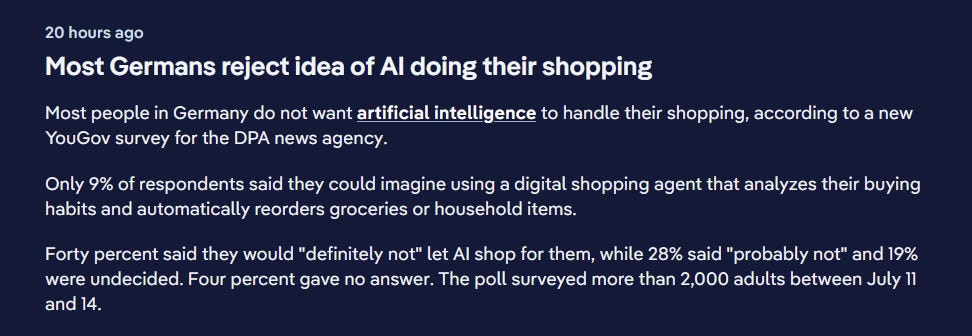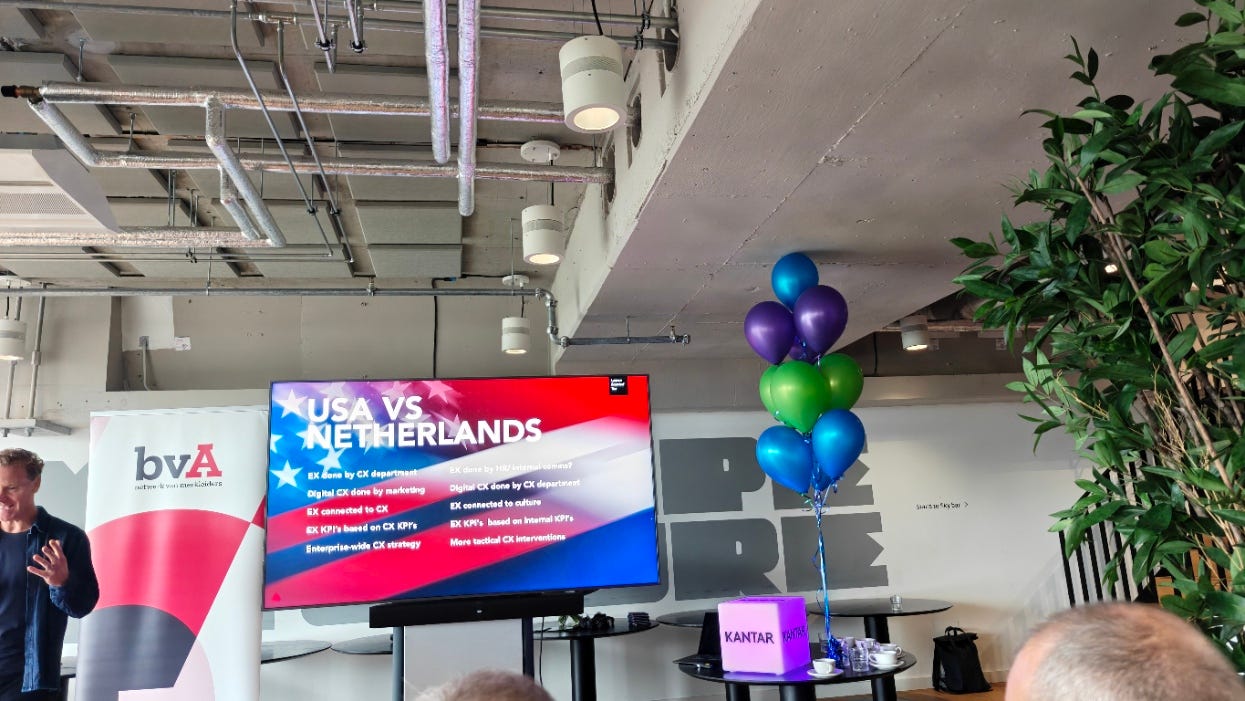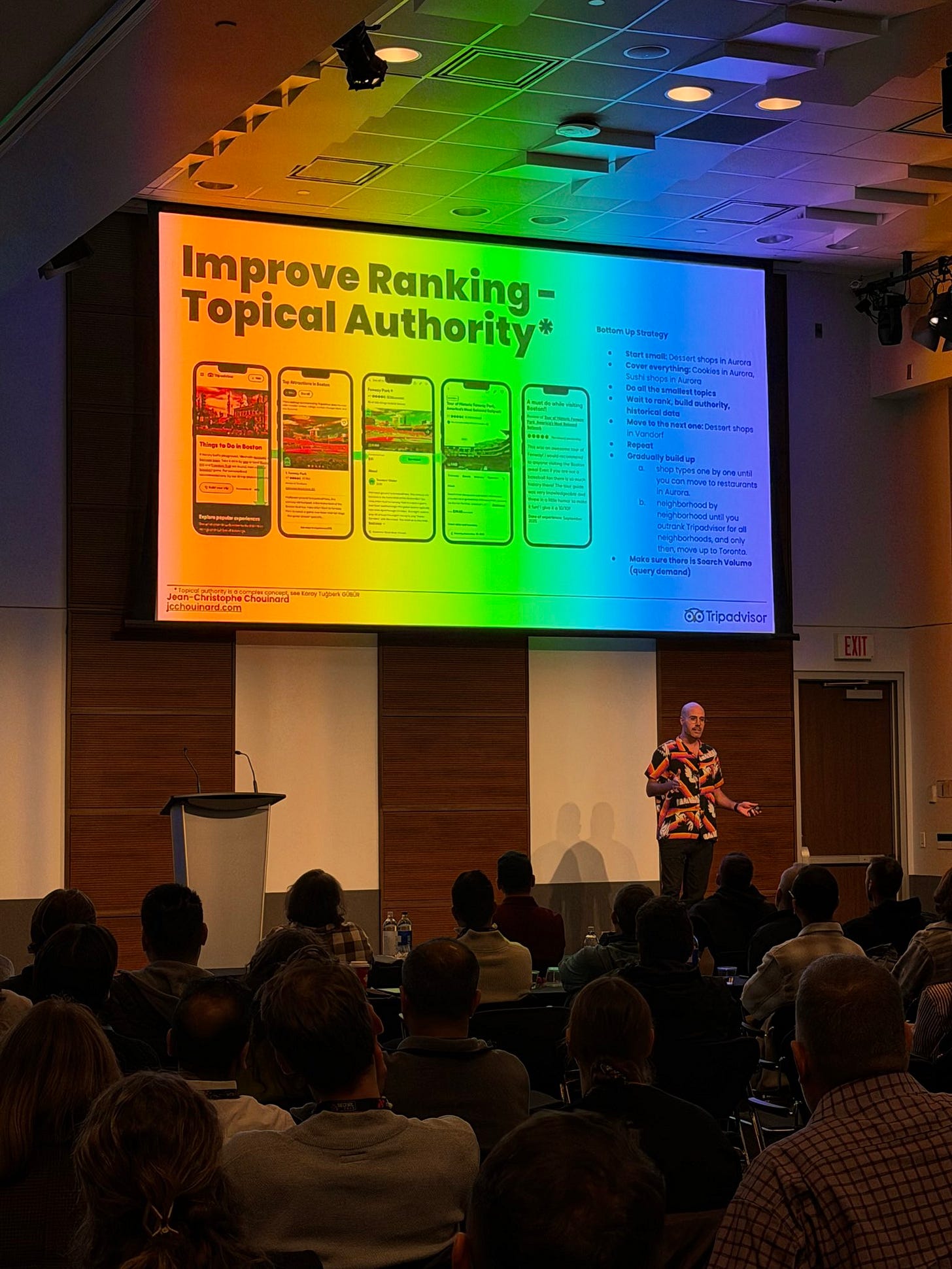Global Digital Marketing & Retail by Alex 112
Inspiration from across the world for retail enthusiasts, e-commerce professionals, marketing lovers and technology fans. Welcome back! I summarized some great links again, I stumbled upon this week.
A very good morning to all of you, wherevery you are! Herewith the latest edition of my newsletter on global marketing & retail. I attended again some events and took some pictures that I hope you might be able to use in your daily work and that inspire you. Start reading! Message for subscriber Ben: enjoy your holiday and thank you for your support!
📹YouTube CEO Neal Mohan on AI, Censorship & the Future of Creators
Good podcast not too long on YouTube from All-In guys. It touches all kinds of topics: ethical, technica, a product features and international product management & strategy.
What stood out for me was:
The YouTube CEO, explains that the platform’s engagement is “differentiated” because it involves users being “really leaned in into what you’re watching” This intensity of viewing means users often act as “superfans” for their favourite creators (e.g., a “Mr beast superfan”) This “different type of engagement” is considered YouTube’s “secret sauce” because it “actually translates into different ROI” for advertisers, regardless of their marketing objectives.
They talk on YouTube Prime and the integration with linear channels and integration of live broadcasts of linear channels and including creators.
On globalization: The CEO or “Neal” states that YouTube tries “to be as global as we possibly can in terms of principles”. While operating legally in all countries is necessary, the CEO or “Neal” acknowledges that there are situations where YouTube must “push back on that that core (freedom of expression freedom of speech)” principle when local laws or regulations might represent “an encroachment on that sort of a principle.
This is also interesting on detection of AI content: the label #aicontent that will be prominent, but also -this I like the thought-- “Likeness Detection: YouTube is currently working on a feature called “likeness detection”. This algorithm will be advanced enough to detect a creator’s face. But it does not stop there, so imagine you are a (famous) person and someone generates a fake AI of you, YouTube will detect it and you can choose to get it down of the platform or monetize it.
Details in the pod.
🇺🇸 Delta airlines on customer service and customer engagement
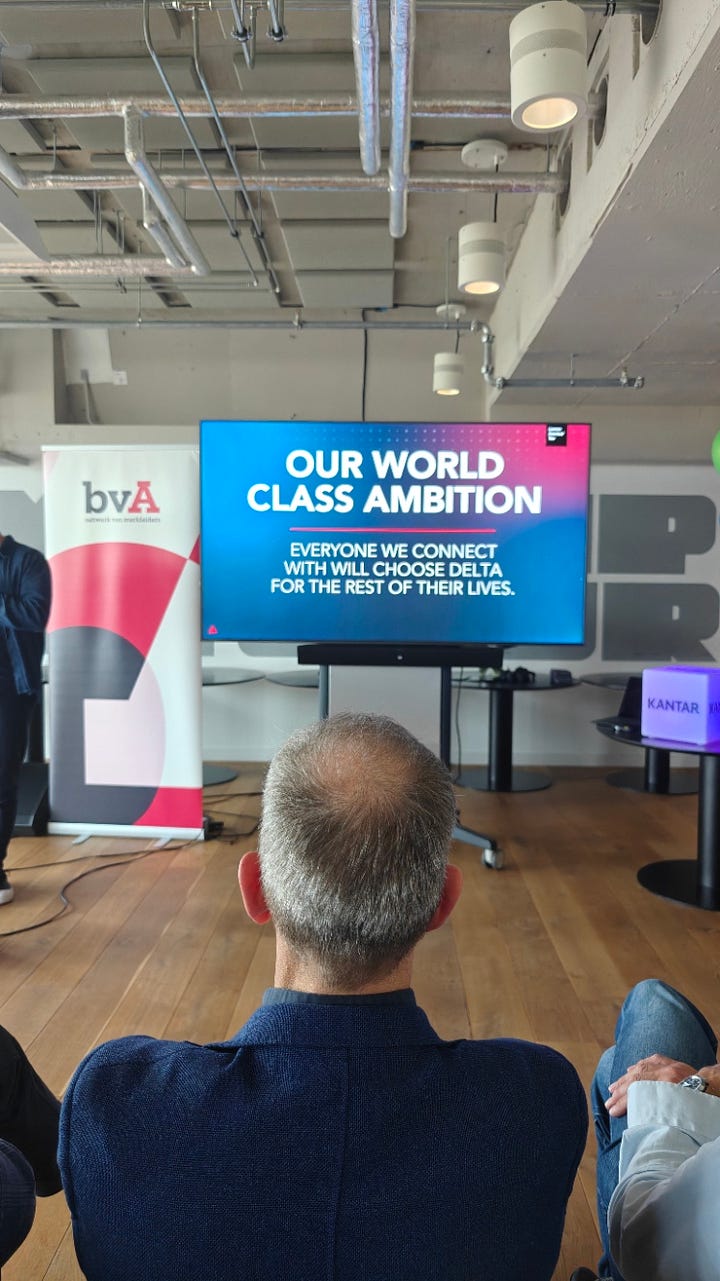
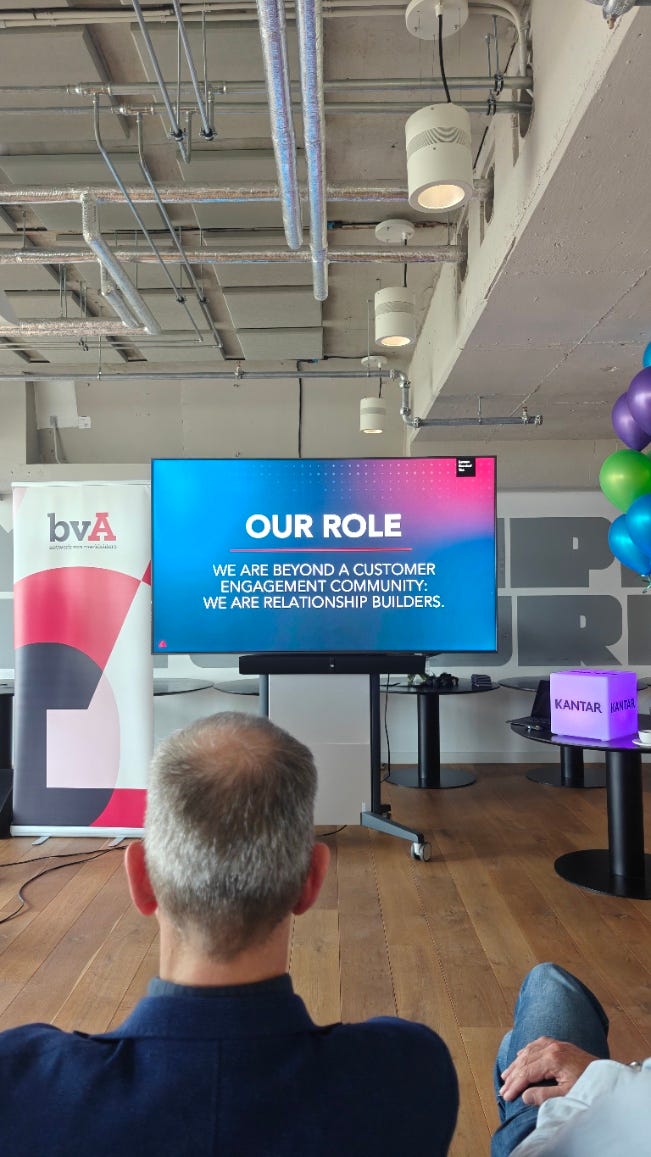
When I started my career, I worked in a customer service center. That experience taught me how essential great customer support is, not only for solving issues but also for retaining customers and building loyalty.
Last week, I attended a workshop where a case from Delta Airlines was presented. Unfortunately, I can’t share the most interesting details, as they asked us not to spread them too widely. But what I can share is their clear ambition: to make customer support a true driver of customer satisfaction and long-term relationships.
Because customer support is not a sluitpost, but a starting point, or better yet, a retention point.
🇩🇪 Germany: Most Germans reject the idea of AI doing their shopping
I like Germany. I like the Germans. I speak German, and I work with many passionate and knowledgable German colleagues who have great digital ideas to move the country forward.
But as we all know, Germany lags behind in many digital areas. So when I read this news, I thought: “not good.” : Only one in 11 people in Germany would let AI agents shop for them. Most are hesitant about using AI for shopping, with only 9% open to it and a majority opposing automatic reordering ( data via YouGov).
This mindset slows down e-commerce development and innovation, I think. The ideas are there, the people are ready, but management and politics too often remain , cautious, and focused on minimizing risk instead of creating progress.
And yet, you do see innovation. Take a look at this REWE supermarket in Germany:
A great example of how technology can make shopping more efficient and enjoyable. Products sold per weight are handled automatically through smart integrations between Trigo and Mettler Toledo, no manual weighing, no errors. And with digital retail media screens, the store turns every visit into both a shopping and communication experience.
The potential is there, it just needs more room, trust, and courage to grow.
Details: https://www.anews.com.tr/tech/2025/10/11/only-one-in-11-would-let-ai-agents-shop-for-them
🤣AdAge wakes up: ChatGPT is the new storefront, here’s how brands must adapt

I am writing on this now already for more then a year, and now legacy media AdAge also wakes up. It only confirms I was on the right track.
The competition is no longer about who can outspend rivals on ads. It’s about who earns a place in ChatGPT’s shortlist of recommendations. Where Google once offered 10 blue links, ChatGPT may surface only three viable options. That shift makes high-quality, contextual, real-time product data the new storefront.
B2B marketers should expect discovery and conversion in SaaS, fintech and health care to collapse in the same way.
The cart’s relevance is disappearing. The question now is which brands will provide the best experience.
Details: https://adage.com/opinion/aa-why-brands-must-adapt-to-chatgpt-instant-checkout/
🖼️Unassorted pictures from workshop on customer and employee experience.
I have attended a workshop on customer experience in Amsterdam, and I like to share a few pictures, that I think can be useful for others as well.
Unfortunately somehow “live photo’s” was switched on at my One Plus Phone and it does not do a good job at focusing at texts, so it might be a bit unreadable, but it’s still good enough to get the basic idea.
In this comparison between the USA and the Netherlands, we see a fundamental difference in how organizations approach Employee Experience (EX) and Customer Experience (CX).
In the U.S., EX is usually managed by the CX department, with a strong marketing influence. The focus is on aligning employee experience directly with customer outcomes, measured by CX KPIs and supported by an enterprise-wide strategy. In other words, EX is treated as a business driver tied to customer results.
In the Netherlands, EX tends to sit under HR or internal communications, focusing more on culture and internal satisfaction. The KPIs are more inward-looking, and the actions are often tactical rather than strategic.
I think I prefer and believe more in the US way.
More pictures of slides of the event, that you might be able to use in your own daily job:
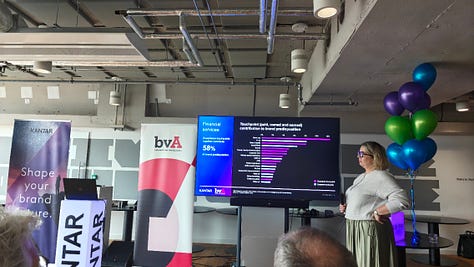
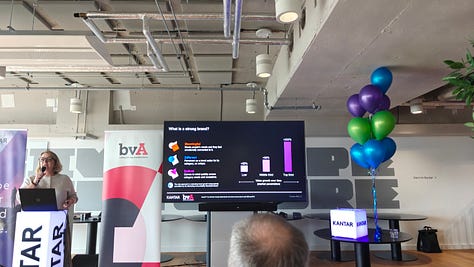
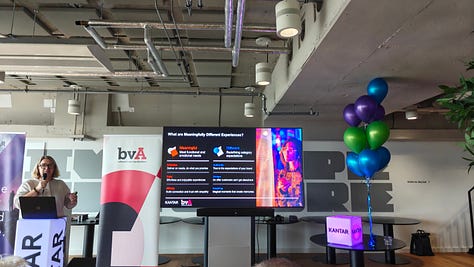
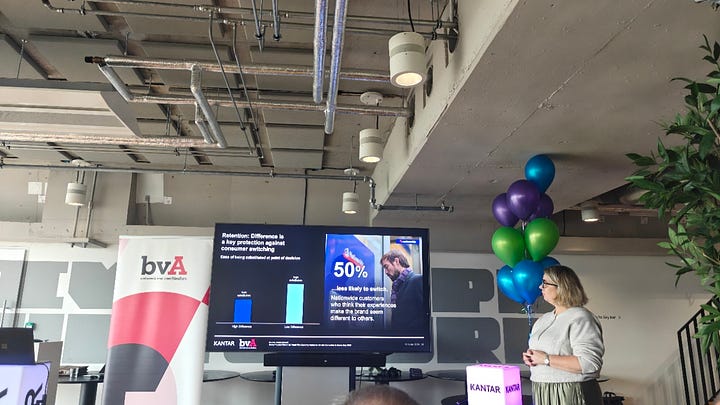
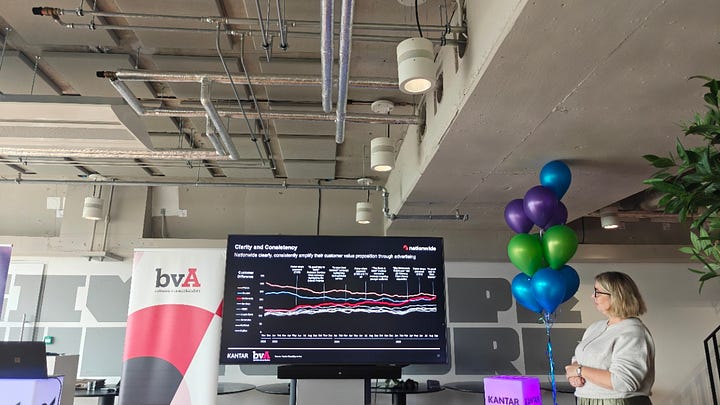
Another part of the talk was how to differentiate as a brand. I uploaded some pictures on that topic as well. Turns out:
An app can make a huge difference in customer experience compared to other channels.
Constant innovation (new features), product feature fit, keeps customers.
A strong brand is:
Meaningful: Meets people’s needs and connects emotionally
Different: Seen as unique or a trendsetter
Salient: Comes to mind quickly in relevant situations
Revolut ranking high in both usage and perceived difference compared to traditional banks, I think their constant testing and feature /partnership release helps massively in that.
What are Meaningfully Different Experiences?
Meaningful: Meet functional and emotional needs
Effective: Deliver on needs, do what you promise
Easy: Effortless and enjoyable experiences
Affinity: Build connection and trust with empathy
Different: Redefining category expectations
Authentic: True to brand expectations
Unique: Offer something customers can’t get elsewhere
Inspiring: Create magical moments and memories
Thanks Kantar for the invite of this workshop.
🦾Try it: MarkBot is live: free consultancy from a marketing authority!
I have a few books of Mark Schaefer, a marketing authority and strategist. Great books. Now Mark made a custom GPT that’s open to anyone, where he’s put all of his knowledge and books so you can ask him questions directly. Yeah talk to the author and strategist himself, well..the AI version..
Will this be the future of consultancy? First addressing a custom GPT, and only turning to the real expert when things get complex or when a human touch is needed?
Experts that help business grow via a custom GPT and then when grown and more customised expertise is needed, the human consultant is needed.
It might be, give it a try!
I choose impact. So, I did a thing. I created The MarkBot -- an Expert Trained Model informed by my public work, like books, blog posts, speeches, classes, strategic frameworks, and more.
Why would I give away my knowledge base for free?
This isn’t the first time we’ve had this debate. In the early days of content marketing, your boss probably said: “What??? You want me to give away my content and best ideas for free on a blog?”
Yes.
Because if you didn’t, your competitors would. Their content would be discovered, highlighted, and shared -- and you’d lose out.
https://businessesgrow.com/2025/10/08/marketing-consulting/
🇨🇳 The Economist on Chinese brandnames that go global

Chinese brand names can be fun. I always took pictures of them when when I was walking in Chinese cities or business districts.
But many of those companies are, really large and now expanding across the world and do so succesfully (SHEIN, POP MART etc). This article in the Economist is about Chinese brand names that go global. Interesting read for us crossborder marketers.
Biemlfdlkk is a mouthful. It is not exactly clear how to enunciate the eight-consonant jumble in the Chinese golf-apparel brand’s English name. It is even hard to write. But the company is expanding overseas, recently acquiring two foreign brands. This was probably a factor that led it to ditching the odd string of letters it had operated under for 21 years. This year it is swapping the old name for one that is a bit more intelligible: Biemlofen.
Details: https://www.economist.com/business/2025/09/11/how-do-you-pronounce-biemlfdlkk-the-brands-lost-in-translation
or checkout the unpaywalled version via Archive.is
🔍Topical authority: start small, niche, then expand and interlink
Topical authority was already important, but it get’s only more important with all changes in search and discovery.
JC Chouinard’s SEO IRL 2025 talk, focuses on building topical authority by starting with niche, high-demand topics like local dessert guides. Start small to establish initial search engine credibility, expansion then involves creating a hub of interlinked subtopics, such as travel guides with related pages, to enhance site authority. Very useful slide and framework!
Via : https://x.com/ChouinardJC
Warm greetings, connect via: Alex Baar
Or checkout my archive of previous newsletters if you want to read more :


